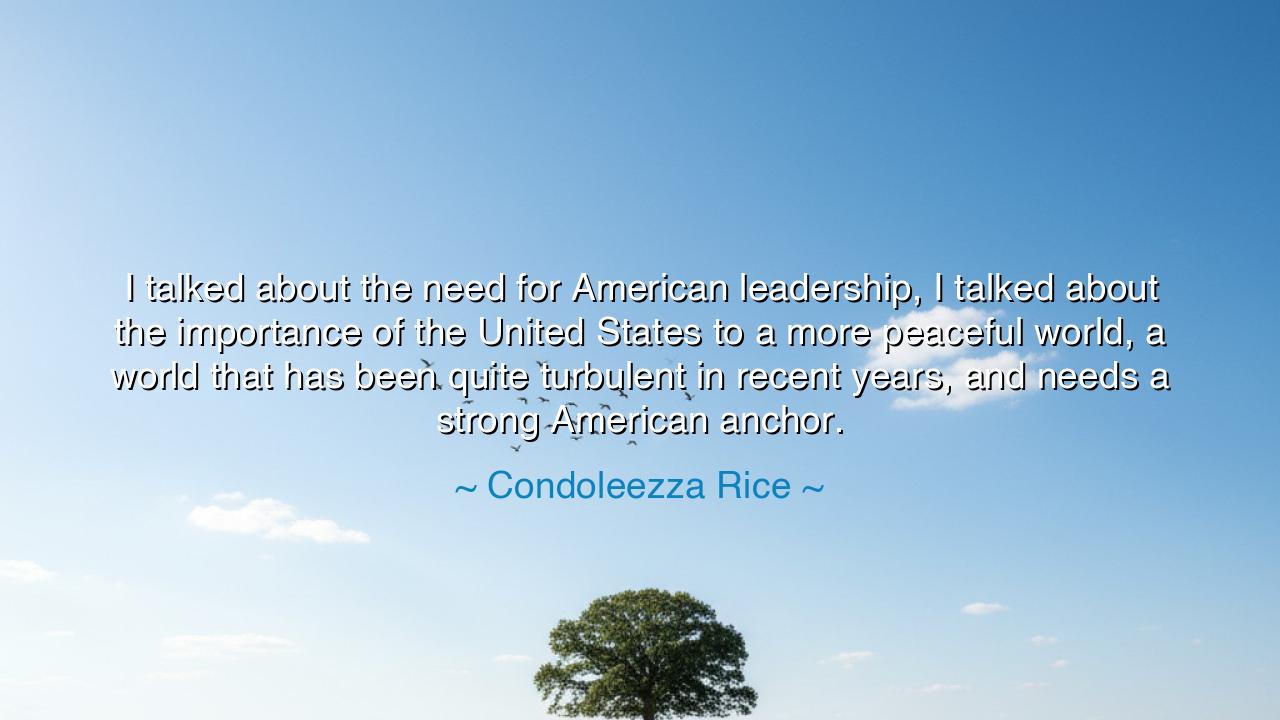
I talked about the need for American leadership, I talked about
I talked about the need for American leadership, I talked about the importance of the United States to a more peaceful world, a world that has been quite turbulent in recent years, and needs a strong American anchor.






In the firm and far-seeing words of Condoleezza Rice, we hear not merely the reflection of a stateswoman, but the echo of a truth that has guided nations since the dawn of civilization: “I talked about the need for American leadership, I talked about the importance of the United States to a more peaceful world, a world that has been quite turbulent in recent years, and needs a strong American anchor.” These words, spoken with conviction, summon the ancient understanding that power, when guided by wisdom and virtue, is not tyranny — but stewardship. Rice’s message is not one of conquest, but of responsibility — the solemn duty of strength to preserve order amidst the storms of history.
The origin of this quote lies in Rice’s reflections as a diplomat and scholar, forged in the crucible of both war and diplomacy. As Secretary of State, she stood at the helm of American foreign policy during a time when the world trembled — the years following September 11th, the wars in Iraq and Afghanistan, the rise of new powers and the shattering of old certainties. In her words, she recognizes that turbulence is not new to the world, but that in such times, leadership becomes not a luxury, but a necessity. When she speaks of an “American anchor,” she evokes not dominance, but stability — the idea that a mighty nation, if guided by principle, can steady the ship of humanity through tempests of fear and conflict.
From the dawn of nations, this theme has echoed through the annals of history. The great empires of old — Athens, Rome, Persia, and China — each faced their moment when strength was demanded not merely for survival, but for the preservation of peace. When Rome ruled the known world, she spoke of the Pax Romana — the peace of Rome — not as the silence of submission, but as the order secured by law and governance. Yet Rome’s peace endured only so long as her power was coupled with justice. When pride replaced prudence, when ambition drowned compassion, the empire that once anchored the world collapsed beneath its own weight. Thus, Rice’s words carry both promise and warning: that leadership, if noble, uplifts the world; if corrupt, it consumes it.
When she speaks of American leadership, she invokes not a banner of conquest, but a beacon of example. For the strength of America, in her highest vision, lies not merely in armies or wealth, but in ideals — in the belief that freedom, when coupled with responsibility, can guide nations toward dignity and peace. This is the same principle that inspired the Marshall Plan, when the United States, victorious in war, chose not to enslave the defeated but to rebuild them. It is the same light that shone when American voices helped dismantle the walls of tyranny across the world. Leadership, in this sense, is not the loudness of command, but the quiet power of conviction — the courage to act when others falter, and the humility to serve when others grasp for glory.
Yet Rice does not speak as one blind to the turbulence of our age. The 21st century, like the centuries before it, is marked by the chaos of division — wars born of ideology, greed, and fear. In such times, her call for a “strong American anchor” is also a call for moral steadiness. The anchor does not steer the ship; it holds it fast when waves threaten to overturn it. So too must nations of power act — not as masters of destiny, but as guardians of stability, ensuring that the waters of history do not drown the hopes of humankind. In this lies the essence of her message: that the strong must bear the weight of duty, lest the world drift into darkness.
We may see a reflection of this principle in the life of George Marshall, the general who became a peacemaker after war. Having witnessed the devastation of Europe, he knew that victory without compassion breeds only ruin. His plan to rebuild the world was an act of leadership that transcended politics; it was the embodiment of strength guided by conscience. Through his efforts, nations once shattered rose again, and the fires of hatred gave way to the dawn of cooperation. Marshall understood what Rice would later express — that power untempered by wisdom is chaos, but power guided by responsibility becomes the foundation of peace.
So, what lesson may we draw from Rice’s words, we who are citizens not of one nation, but of a shared world? It is this: that every individual, like every nation, is called to leadership in their own sphere — to be an anchor of stability in times of unrest, a source of hope in times of despair. True leadership is not born from dominance, but from service; it does not shout for attention, but acts with quiet integrity. When your world trembles — in your community, your family, your heart — be as the anchor she speaks of: steadfast, grounded, and guided by principle.
For as Condoleezza Rice reminds us, the peace of the world — like the peace within a soul — depends upon those who will not drift with the tides of fear, but stand firm with faith, purpose, and vision. The storms of history will always come, but if each of us learns to hold fast, to act with courage and wisdom, then together we may yet build a world anchored not by power alone, but by the strength of righteousness and the light of peace.






AAdministratorAdministrator
Welcome, honored guests. Please leave a comment, we will respond soon